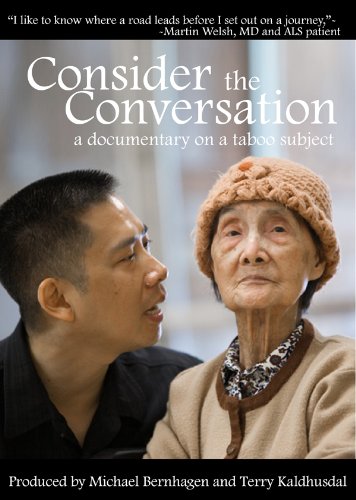Health care systems compete with each other on a regular basis, but often the needs of their communities cause them to set aside their differences for a time. They come together and do something for the greater good, because it is the right thing to do.
I was privileged to see this happen in one of the communities we serve. Three hospital CEOs shared a stage to welcome people to a viewing of a film called “Consider the Conversation,” which was first released in 2011. I spoke with Ginni Pedersen, RN, who is working to bring this information to other communities we serve, to get her perspectives on this film.
About the Film
This 60-minute film was co-produced by the brother of one of the patients who was featured. The patient, Peter Kaldhusal, was dying of pancreatic cancer. He talked about how we often live our lives with the idea of “what’s next?”
 So when we are in kindergarten, we look forward to the time we will enter grade school. Then we ask “what’s next?” and think of junior high, then high school, and so forth. When Peter was diagnosed with pancreatic cancer, he began by thinking that what was next was some form of treatment.
So when we are in kindergarten, we look forward to the time we will enter grade school. Then we ask “what’s next?” and think of junior high, then high school, and so forth. When Peter was diagnosed with pancreatic cancer, he began by thinking that what was next was some form of treatment.
But one day, the treatment is no longer working, and when he asks himself “what’s next?” the answer is “nothing.” That causes him, and us, to stop and ponder deeply. Where is the meaning of our life? Is it in “what’s next” or is there something more important? How do we find the examples that will help us take these next steps?
The film also follows a physician Dr. Martin Welsh who is going through his own terminal illness, Lou Gehrig’s disease or A.L.S. In this condition, your muscles slowly stop working from the legs up, until you become first bedbound, then unable to speak, and eventually die.
The time course of this illness is highly variable, and to hear the experience from a physician is very interesting. The most valuable take-away might be how he describes that his choices of care needed to be his, not someone else’s.
This leads to a discussion of the conversations we need to have around our health care choices as we approach serious illness (expected or unexpected, as in the cases of accidents that lead to brain injury) or our own death. While these discussions may be difficult to begin, once approached, they bring people closer together.
In the film, there are interviews interspersed with vintage home movies, lending a sense of timelessness and continuity. Our lives are connected with each other and with those who came before and who will come after.
Our Take on the Film
At times, the movie may seem a little long, but the length also lets the message sink in. These are not things we can just “tweet” about and be done. They touch our very souls and we need to sit with them. Some may take offense at how medical professionals sometimes come off as the “bad guy” for not having these conversations but more will take up the challenge to do better.
This movie is a highly valuable experience for all of us: whether we are approaching senior status ourselves or have parents approaching older age. Especially it is of value for each of us as we learn how to gain some sense of peace about what might happen if we cannot speak for ourselves.
Last Updated: March 14, 2024
1 Trackback